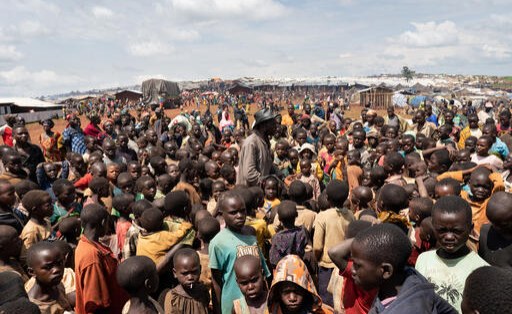
| The size of the camp – located in Rhoe, 45km northeast of the provincial capital Bunia and only accessible to aid agencies by helicopter – has nearly quadrupled over the last two weeks |
| ITURI, Democratic Republic of Congo, Up to 75,000 displaced people – including 35,000 children – living in a remote and inaccessible hilltop camp for displaced people in the province of Ituri in the Democratic Republic of the Congo are braving “hellish conditions” without adequate food, shelter, protection, security and sanitation, UNICEF has warned. The size of the camp – located in Rhoe, 45km northeast of the provincial capital Bunia and only accessible to aid agencies by helicopter – has nearly quadrupled over the last two weeks. Humanitarian access by land is not possible because aid workers have been denied access or shot at by armed groups on several occasions over the last month. The huge growth of Rhoe camp – up to 50,000 people are estimated to have arrived in the past two weeks – has followed several attacks on nearby camps at Drodro and Tche by armed groups, forcing thousands of already-displaced people to seek sanctuary there. Over the last few weeks, 35 children, including 14 girls, were reported to have been killed or injured, some hacked to death by men wielding machetes. At least 13 girls were recently raped while attempting to find food in fields adjoining the camp. Militants have also destroyed three hospitals and two schools in the area. It is impossible to verify exact figures on the number of violations committed against children, including kidnappings, because of persistent insecurity and lack of access to the Rhoe area. The hilltop camp is located immediately next to a MONUSCO peacekeeping base. At least 35,000 children have taken refuge there, including more than 60 who were separated from their parents. “Displaced people fled to Rhoe in the hope of finding some kind of safety and protection,” said UNICEF Bunia Chief Field Officer Ibrahim Cisse, “But in reality, they remain in danger. About 35,000 children and their families are enduring hellish conditions, effectively being held hostage, unable to move, on a remote hill in a dangerous and inaccessible part of Congo. They face serious food, sanitation, accommodation, protection and security issues inside hopelessly overcrowded and unsanitary shelters.” The influx of new arrivals has severely stretched Rhoe camp, situated on uneven and often sloping land, to breaking point. Many of those who have arrived in the last fortnight do not have shelter or food and must sleep in the open. Some have sought overnight shelter in the camp’s latrines. Camp resident Betune Ngave, 65, typifies the suffering of many displaced people. She has been displaced several times since 2018, witnessing rape and mass murder in the process. Her husband was decapitated three weeks ago by militants and six of her seven children were killed in another attack in 2018. “We have fled many times,” she said, “and seen our homes burned and children raped. My parents, my brothers, my sisters, and six of my children have all been beheaded or shot.” Ms Ngave now lives in a flimsy and crowded shelter, about a quarter the size of a large car, which is neither wind nor rain-proof. It is estimated there are about 1,300 people for every toilet in Rhoe camp and sewage flows openly through densely inhabited areas. Access to locally grown food in the camp is almost non-existent because inhabitants are likely to be attacked by militants if they venture too far outside in search of food. There are now major concerns about the nutritional status of children and pregnant or breastfeeding women, with UNICEF officials warning that the situation could deteriorate very quickly. Water is likewise in perilously short supply, with children venturing down the hillside with jerry cans to collect drinking water. If that is too dangerous, inhabitants collect water from nearby swamps or small rivers. Such journeys to collect food and water can put children at risk of violence and makes them vulnerable to sexual exploitation. An alarming number of people have died recently in the camps because of respiratory illnesses, diarrhoea and malaria. While Rhoe camp has a health centre, there are few beds and mothers with children mostly gather on the floor. The centre’s over-stretched staff carry out about 180 consultations per day. It is impossible for desperately sick people to be referred to hospitals and there is a lack of burial equipment for funerals. UNICEF through its Rapid Response Programme imminently intends to distribute 5,500 Non-Food Item kits – including blankets, buckets, jerry cans, kitchenware and soap – in addition to tarpaulins and tents. UNICEF plans to hand out individual water treatment tablets to camp inhabitants and is working with its partners to provide psychosocial support to over 500 children affected by armed conflict in the camp. Help is being provided to 58 children still separated from their families- so far only five children have been reunited. Moves are afoot to survey the level of malnourishment in the camp in coordination with the World Food Programme and other agencies. UNICEF is also lobbying to improve sanitation in the camp, in addition to working with MSF to bolster health support. |
